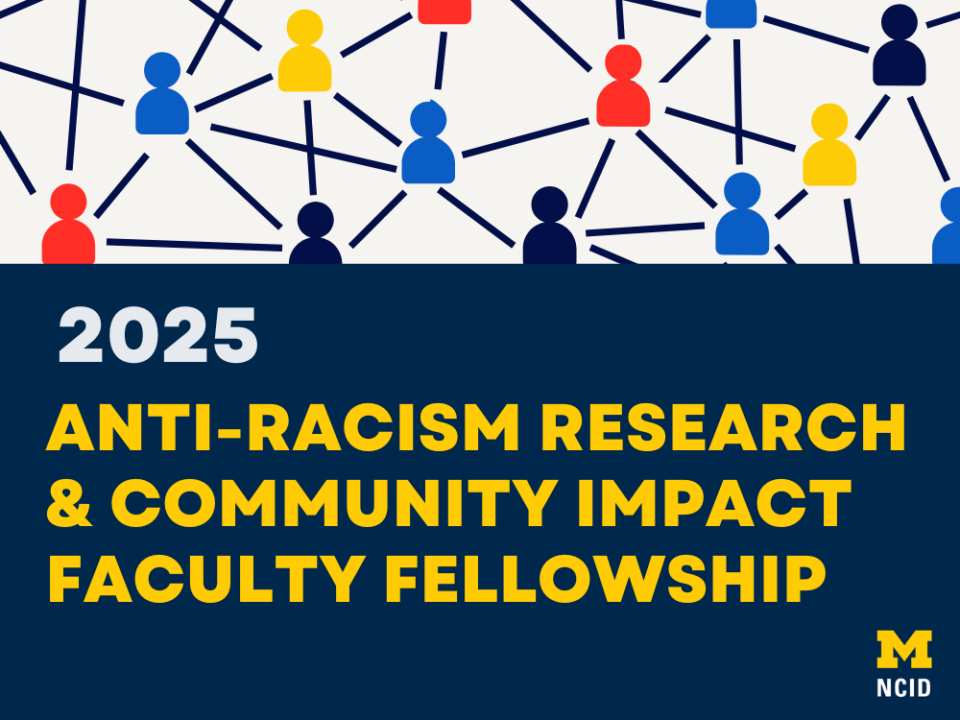- About
- News
- Events
- Initiatives
- Anti-Racism Collaborative
- Change Agents Shaping Campus Diversity and Equity (CASCaDE)
- Diversity Scholars Network
- Inclusive History Project
- James S. Jackson Distinguished Career Award for Diversity Scholarship
- LSA Collegiate Fellowship Program
- University Diversity & Social Transformation Professorship
- Publications & Resources
- About
- News
- Events
- Initiatives
- Anti-Racism Collaborative
- Change Agents Shaping Campus Diversity and Equity (CASCaDE)
- Diversity Scholars Network
- Inclusive History Project
- James S. Jackson Distinguished Career Award for Diversity Scholarship
- LSA Collegiate Fellowship Program
- University Diversity & Social Transformation Professorship
- Publications & Resources

Scholar Story: Chien-Chi Tseng
February 28, 2017
Traveling Blackness: Navigating Race and Immigration
March 20, 2017Scholar Story: Stephanie Cook
by Charlotte Ezzo
How do social and developmental factors influence attachment styles, which in turn influence health and well-being?
When I asked why her research is important, I could hear New York University assistant professor Stephanie Cook smile over the phone. For good reason too, because her research is critically important to not only the populations she studies, but also to the field of public health in general.
Dr. Cook describes herself as a public health psychologist. She works with young racial and sexual minority men, studying how their social environments influence the development of their sexual and racial identities, as well as how their attachment styles develop during the emerging adulthood period. An attachment style is a level of attachment -- or intimacy -- individuals have with parents, peers, romantic partners, etc. Finally, Dr. Cook's central question is How do social and developmental factors influence attachment styles, which in turn influence health and well-being?

It is this holistic focus on health and well-being that Dr. Cook says makes her work unique among those who study racial and sexual minority men in public health. “Historically, work with emerging adult minority men in public health has been centered around disease and risk prevention only. But this can suppose that certain identities are ‘risky’. I believe it’s important to address the health of the whole person in general, and that’s why I work with developmental psychologists to study psychosocial factors influencing overall health and well-being, using a developmental approach. For example, if we can develop socially informed, attachment-based interventions for minority emerging adult men, we can tackle multiple risk and health behaviors without stigmatizing these young men."
Dr. Cook recently accepted her current position as an assistant professor in the Departments of Biostatistics and Social and Behavioral Health at New York University’s College of Global Public Health in February 2017. She describes her current work as "basic applied research that will later inform attachment based interventions for emerging adult racial and sexual minority men." Dr. Cook’s work in public health is innovative and novel. Thus, she has created The Integrated Attachment and Sexual Minority Stress Model (IASMS) that frames the developmental linkages between childhood attachment, racial and/or sexual minority discrimination, identity formation, adult attachment, and health. Much of her basic applied research aims at testing different components of her integrated model.
Dr. Cook didn’t always know she wanted to get earn her doctorate. As an undergraduate student at the University of Michigan, she studied psychology and women’s studies. She loved those fields, but felt unfulfilled because, although she could work on research studies, there was no “next step” or applied component to the work that actually changed lives. She tried working in the corporate sector, but again felt unfulfilled. She loved research, and since she had a great public health mentor at Michigan (Dr. Marc Zimmerman), she entered a master’s of public health (MPH) program at Columbia University, thinking that an MPH was a good middle ground so that she could do the work she wanted to do but still have some semblance of a work-life balance. After obtaining her MPH, she loved teaching and research so much that she went back to Columbia to obtain her doctorate in public health.
As I was wrapping up the interview, I asked Dr. Cook if there’s anything else she’d like to share; anything she wants readers to know about her scholar story. She wanted to stress that programs like NCID postdoctoral fellowship were very influential for her. One thing she tells mentees is that “we don’t get to the places we are single handedly. Always give thanks to your mentors. We’re always building on the work of others and relying on the help of others.”
For more information on Dr. Cook, visit her profile.




